It seems we can’t find what you’re looking for. Perhaps searching can help.
Sign Up for newsletter!
Subscribe to get the latest eBook!
Hotline






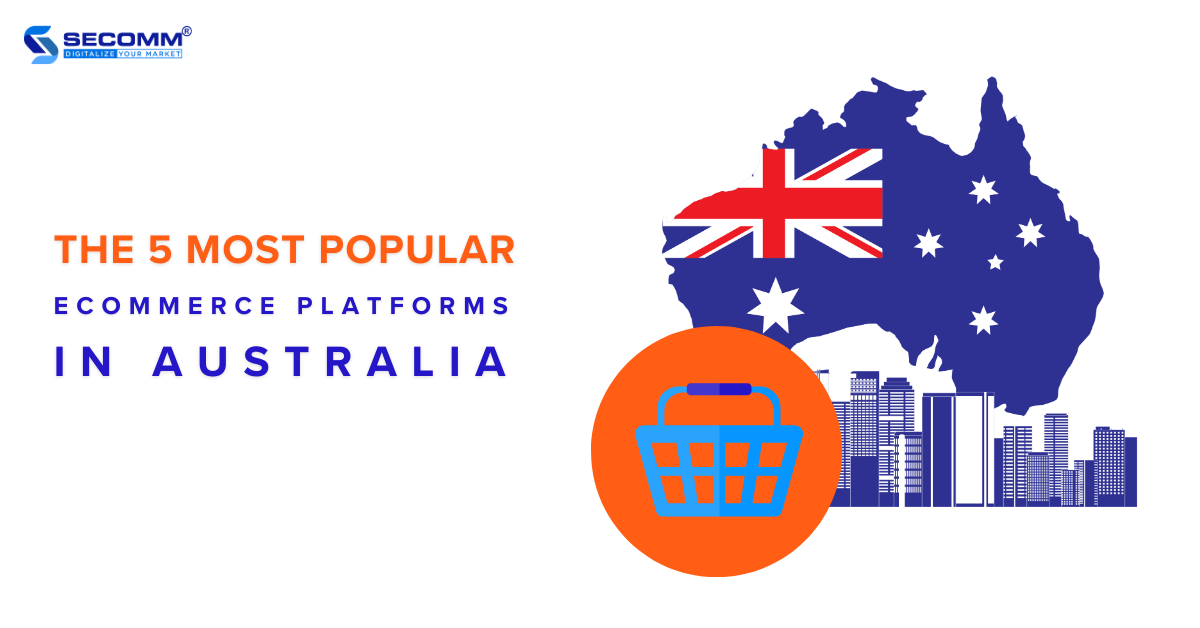
The Australian eCommerce world is continually evolving alongside the constant emergence of technological solutions. As a result, there is an increasing and diverse range of choices for eCommerce platforms.
This presents both an advantage and a challenge for businesses, as selecting the right platform for building an eCommerce website is a crucial first step.
Below are the top 5 leading eCommerce platforms in Australia.
Learn more: Top 10 most-visited eCommerce websites in Australia
Magento is a globally popular open-source platform, and its prevalence extends to Australia as well. According to BuiltWith, there are currently more than 4000 live websites in Australia utilizing the platform.
With its high flexibility, businesses can effortlessly tailor features and scale the system according to their unique business requirements.
Presently, Magento provides businesses with two versions: Open Source (Free) and Adobe Commerce (Paid).
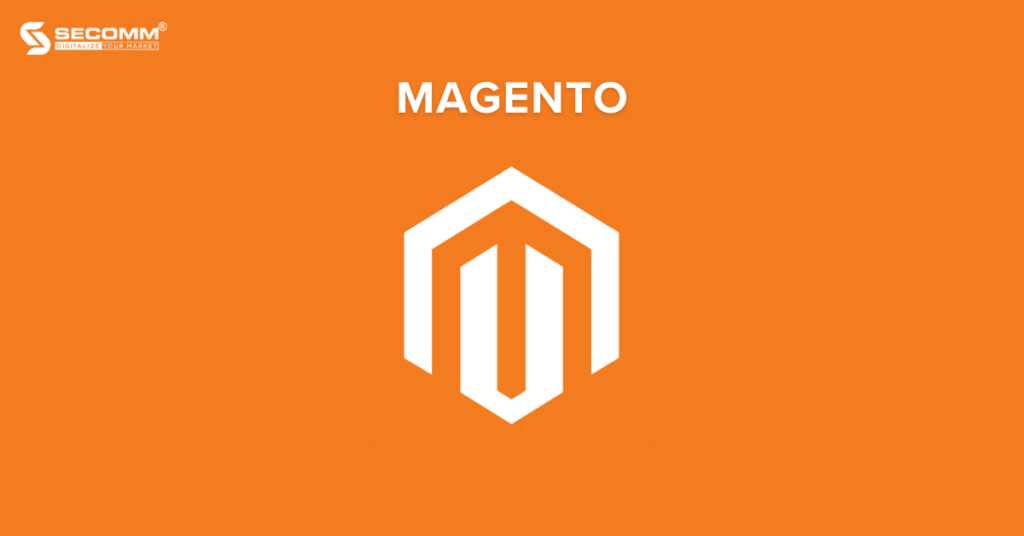
Pros:
Cons:
Core feature:
Pricing:
Learn more: Top Magento eCommerce websites in Australia
Shopify is a popular SaaS platform with over 4.8 million active websites. In Australia alone, over 150 thousand online stores are operating on the platform.
Recently, the premium version of Shopify, ‘Plus,’ has garnered attention from businesses across various sectors in Australia.
These businesses may have previously deployed different eCommerce platforms and later switched to the Plus to seek a superior solution. Some businesses initially launched websites with core plans and later upgraded to ‘Plus’ to optimize their operations.

Learn more: Top eCommerce websites upgrade to Shopify Plus
Pros:
Cons:
Core feature:
Pricing
Here are Shopify pricing plans:
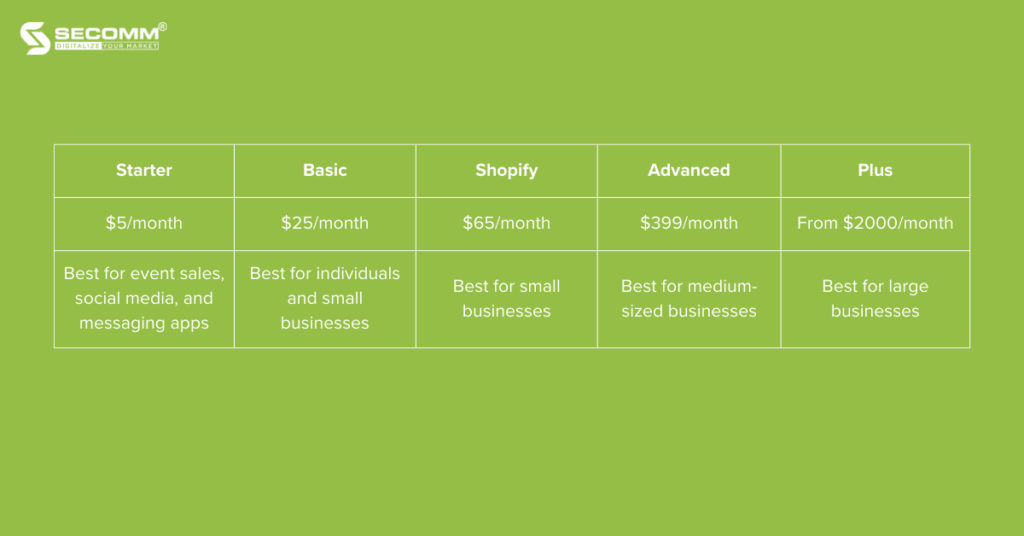
BigCommerce is another popular SaaS platform worldwide, with over 43 thousand active websites. In Australia, there are more than 2 thousand active BigCommerce websites.
The standout feature of this SaaS platform is its integrated features, enabling businesses of all sizes and technical expertise to deploy eCommerce websites quickly. In addition to standard solution packages, BigCommerce offers an ‘Enterprise’ version tailored for large businesses with custom pricing.
Learn more: Top 10 eCommerce websites using BigCommerce
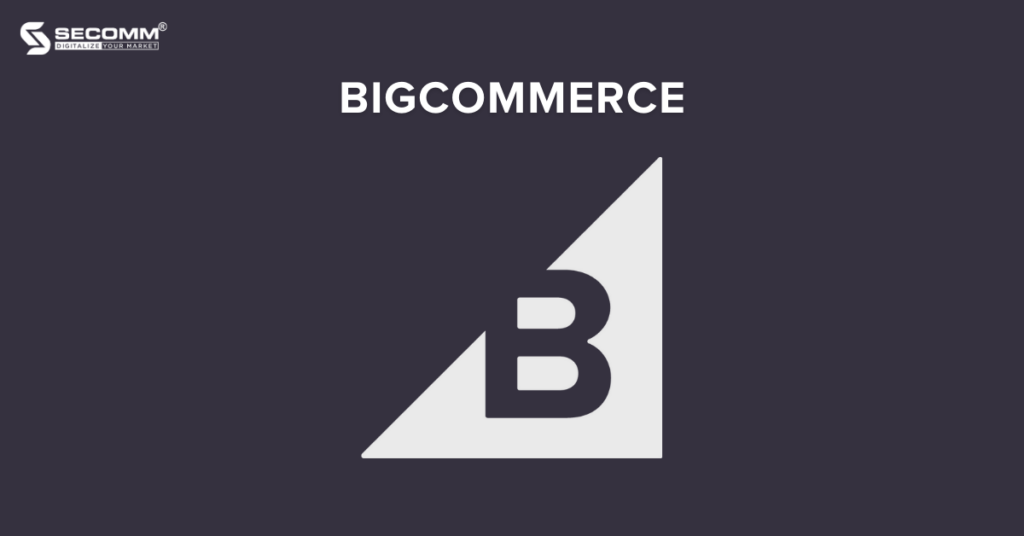
Pros:
Cons:
Core feature:
Pricing
Here are BigCommerce pricing plans:
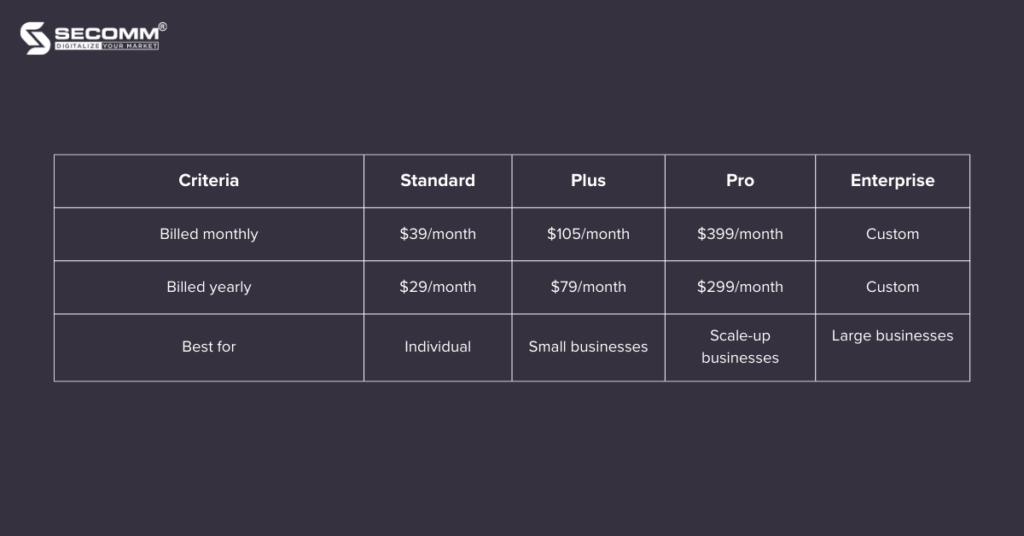
WooCommerce, a free and open-source WordPress plugin, enables brands to integrate eCommerce functionality into their existing WordPress websites.
With just a few clicks, the WooCommerce plugin helps convert a standard WordPress site into a fully-featured eCommerce platform, complete with essential features and easy customization.
Learn more: 20 websites using WooCommerce
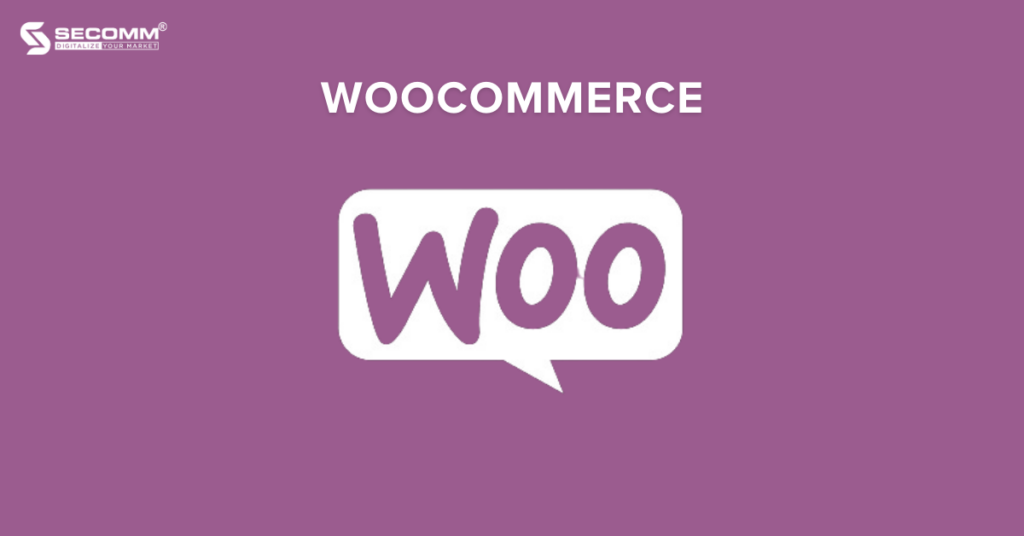
Pros:
Cons:
Core feature:
Pricing: Free to use. However, some integrations with other plugins may incur charges.
OpenCart is a globally popular open-source platform, powering over 900 thousand active websites worldwide. In Australia, it has gained popularity with more than 2 thousand active OpenCart websites, establishing itself as a favored open-source platform in the country, following Magento.
Founded by Daniel Kerr in 1998, OpenCart operates as open-source software, utilizing the PHP programming language. It currently offers two versions: Free (Free-to-use version) and Cloud Store (Paid version).
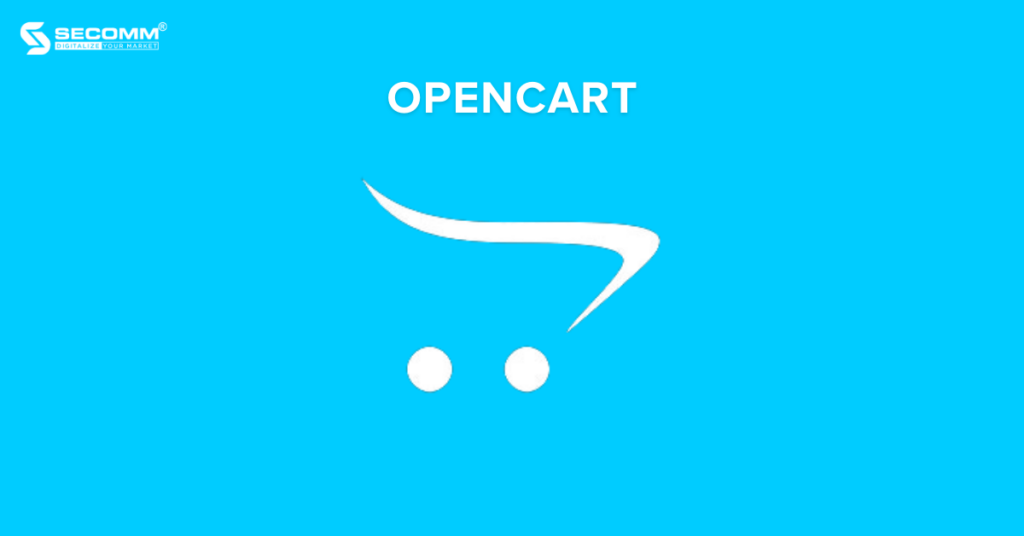
Learn more: Top OpenCart websites
Pros:
Cons:
Core feature:
Pricing:
Free for the Free version. For the Cloud Store version, the specific costs are as follows:
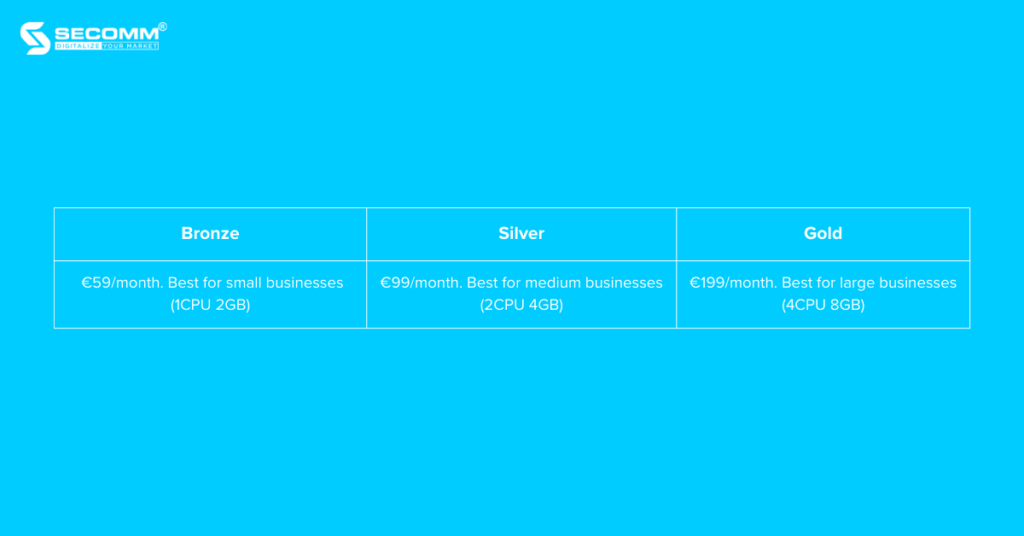
Above are 10 eCommerce platforms preferred by businesses in Australia when establishing their online stores. Each business will make its decision based on factors like scale, business model, and specific deployment requirements.
With over 10 years of experience collaborating with various Australian businesses such as Laybyland, RodShop, Trentham Estate, Jasnor, etc., to build eCommerce websites, SECOMM now possesses a team of highly skilled technical experts and a deep understanding of the Australian market.
For personalized advice on the best-suited platforms for your business, contact us or call the hotline (+84)28 7108 9908 today!
 2
2
 4,534
4,534
 0
0
 1
1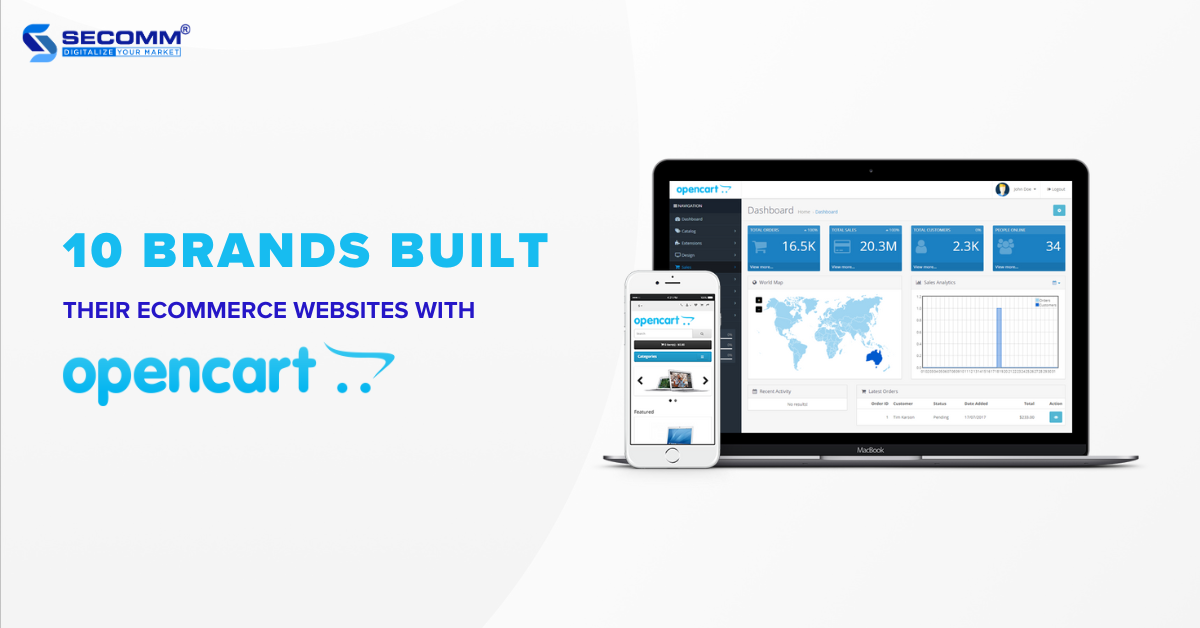
OpenCart is an open-source eCommerce platform based on the PHP programming language, utilizing the MySQL database and HTML components to build eCommerce websites. According to Builtwith, the platform powers over 2,500 websites, with the majority in the United States and Russia.
OpenCart offers businesses various options for building eCommerce websites: Free (Open Source) and Cloud Store (Paid). Due to the flexibility of open-source code, many businesses choose this platform to meet specialized requirements in website development.
Below are some brands that have used OpenCart to create dedicated eCommerce websites
Bensound is the brainchild of musician Benjamin Tissot, founded in 2012. It is an eCommerce website specializing in providing free and licensed music, as well as sound effects. Initially, Benjamin Tissot composed and licensed only his songs on this platform.
However, as the service grew, Benjamin Tissot started accepting musical works from other artists, making it an ideal destination for content creators on platforms like YouTube, Facebook, and Instagram.

Vicrez is an online automotive parts retailer established in 2014 in the city of Whittier, Southern California, USA. What sets Vicrez apart is that customers can shop online for any external car parts and accessories to customize their vehicles according to their individual preferences.

Pharmacy Direct is the first online pharmacy to follow the eCommerce model, owned and operated by pharmacists in Australia since 1996. Initially, the brand operated on a small scale, serving local customers. However, as the demand for health products in Australia steadily increased, Pharmacy Direct experienced remarkable growth.
The business invested more in its eCommerce website to offer over 17,000 products, including vitamins, supplements, beauty products, fragrances, childcare products, prescription medications, and over-the-counter medicines from reputable pharmaceutical brands. This expansion allowed Pharmacy Direct to provide online services to the Australian population.

Get Laid Beds is a business specializing in handcrafting solid wood beds, founded in 2012 by John and Jean, a pair of architect and carpenter friends.
After more than 10 years of development, Get Laid Beds has expanded its product lines to include bedroom furniture, focusing on building its eCommerce website and enhancing customer service. This brand has gained popularity among customers in the UK and the US.

Self Edge is a men’s fashion brand with a vintage style, established in 2006 by the American couple Kiya and Demitra Babzani. Currently, Self Edge has a presence in major cities such as San Francisco, New York, Los Angeles, Portland, and San Jose del Cabo.
Additionally, Self Edge focuses on developing its eCommerce website to reach new customers across the United States and Mexico.

BNA Model World is a model business established in 2007 in Australia. Since its establishment, the brand’s management has focused on the eCommerce market and gradually upgraded its products/services. Currently, BNA Model World offers over 100,000 products from more than 1,000 manufacturers, serving over 104,000 customers worldwide.

Godukkan is a consumer electronics retail business established in 2017 and headquartered in Dubai, United Arab Emirates (UAE). Godukkan’s main goal is to become the number one eCommerce website in the UAE, offering a wide range of products, including laptops, mobile phones, tablets, PCs, gaming equipment, and more.

Get Er Brewed is a beverage brand specializing in brewing beer, wine, tea, etc., as well as supplying fermentation ingredients and brewing equipment. The business was established in 2013 and is based in Northern Ireland.
In recent years, Get Er Brewed has expanded its reach by launching an OpenCart website to cater to an international customer base, achieving certain successes, particularly in securing contracts for the installation of fermentation and brewing systems.
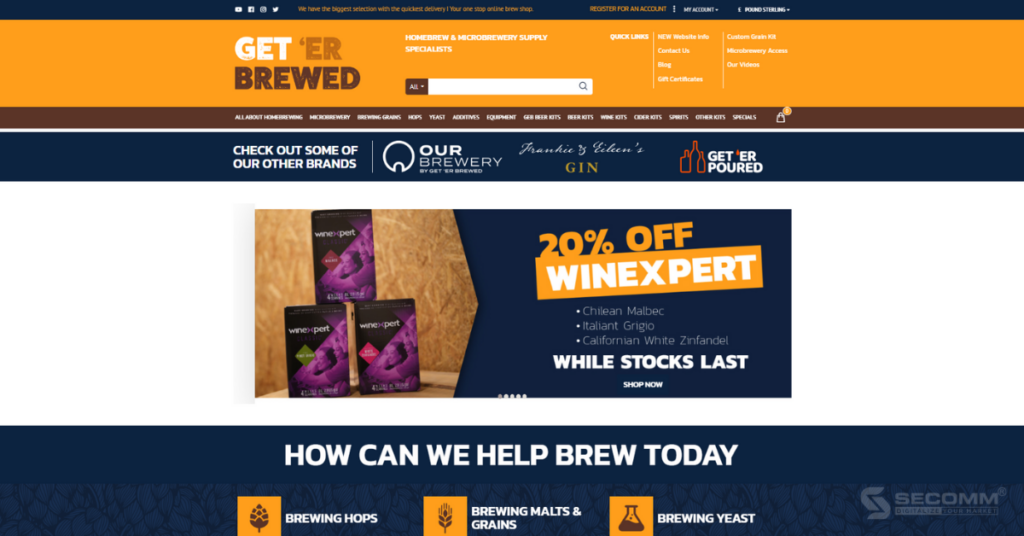
With over 20 years of experience in the pet industry, brothers Raymond and Roger decided to establish CatSmart, the largest cat-centric brand in Singapore. Currently, CatSmart is actively investing in its OpenCart website and expanding its presence beyond traditional retail branches in the “Lion City.”
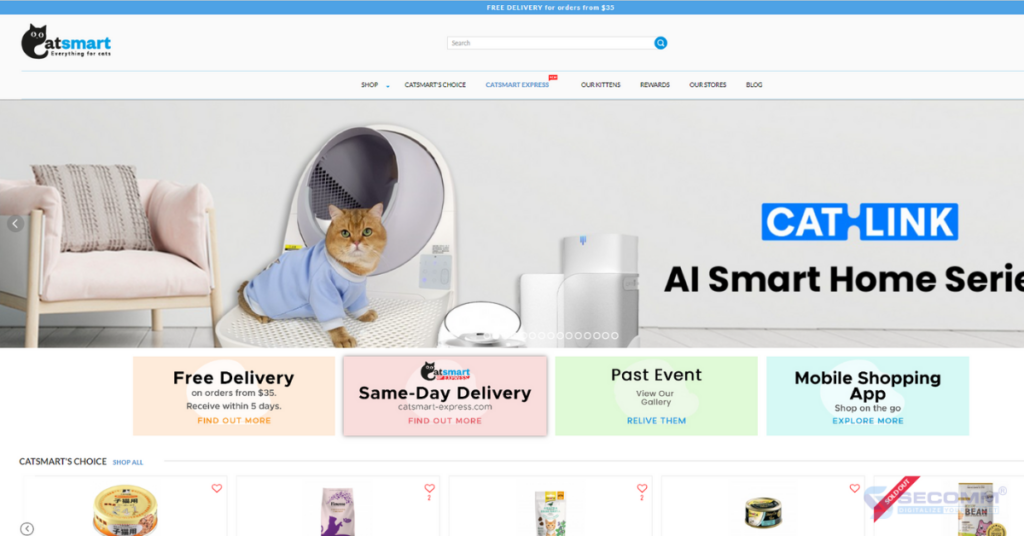
Derails is a business specializing in designing and selling model trains, established in 2010. With the boom of eCommerce, Derails began building an OpenCart website to adapt to the changing market.
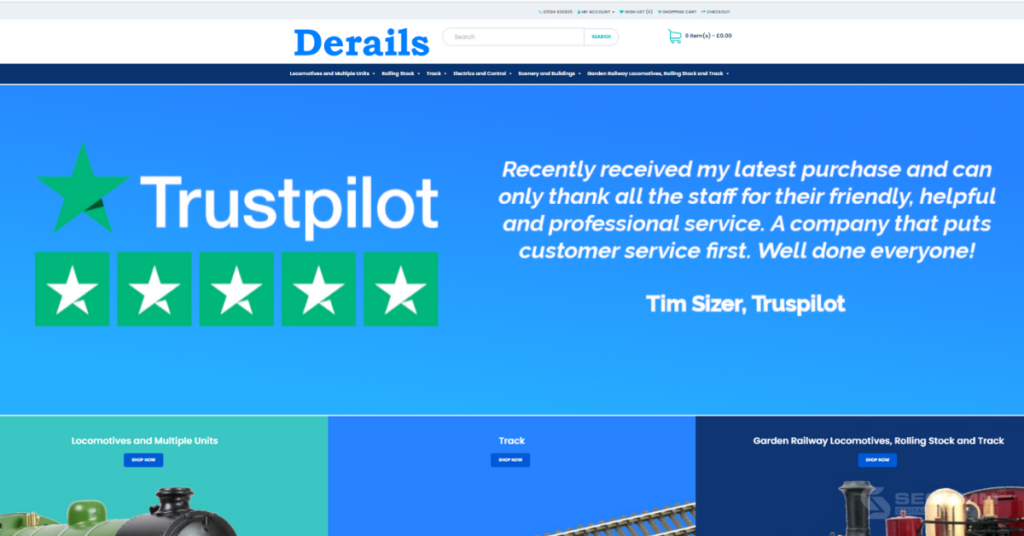
The Bottom Line
Here are 10 brands that have developed OpenCart websites and achieved success in both branding and revenue. This success serves as inspiration for other businesses seeking solutions to break through their operations and enhance competitiveness in the market.
Learn more: OpenCart vs Magento: Which Fits Your Business Best?
With extensive experience in deploying eCommerce for clients in many countries, SECOMM understands the difficulties and challenges that businesses face during implementation.
Contact SECOMM now or call the hotline at 02871089908 today for a free consultation.
 2
2
 11,026
11,026
 0
0
 1
1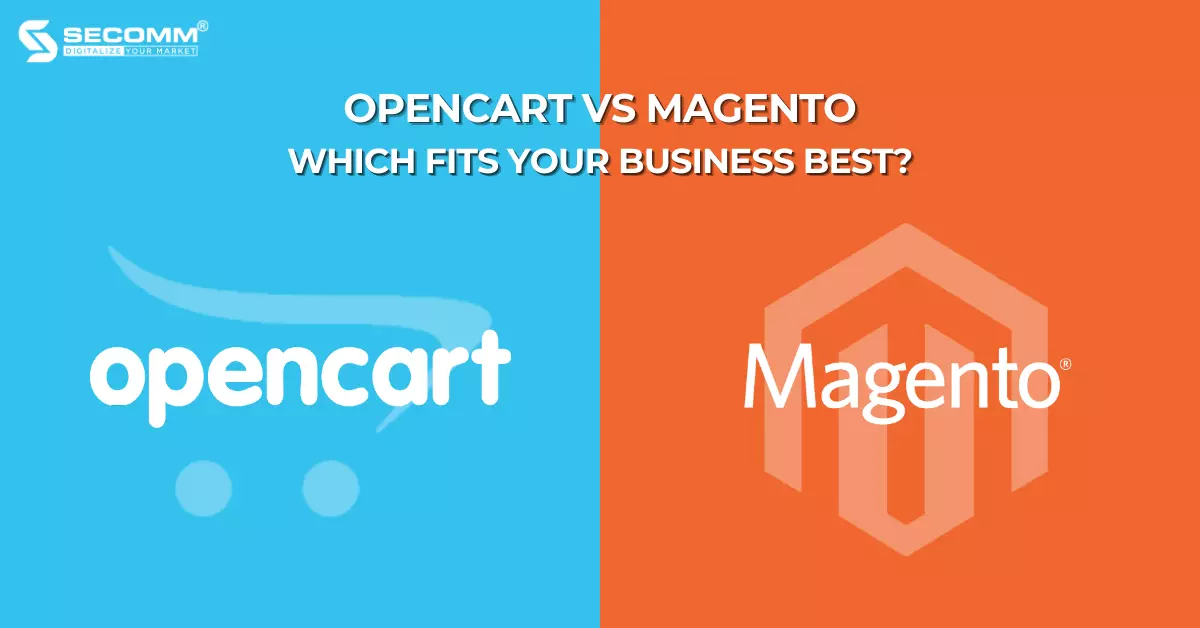
OpenCart and Magento have consistently been pitted against each other as open-source platforms for businesses in need of building specialized eCommerce websites, particularly for enterprises and corporations.
So, which of these open-source eCommerce platforms, OpenCart or Magento, is the right fit for your business?
OpenCart is a freely developed open-source eCommerce platform designed in PHP. It’s favored for its user-friendliness and simplicity, boasting an easy-to-navigate admin dashboard that allows product management, promotions, order processing, and reporting without requiring technical expertise.
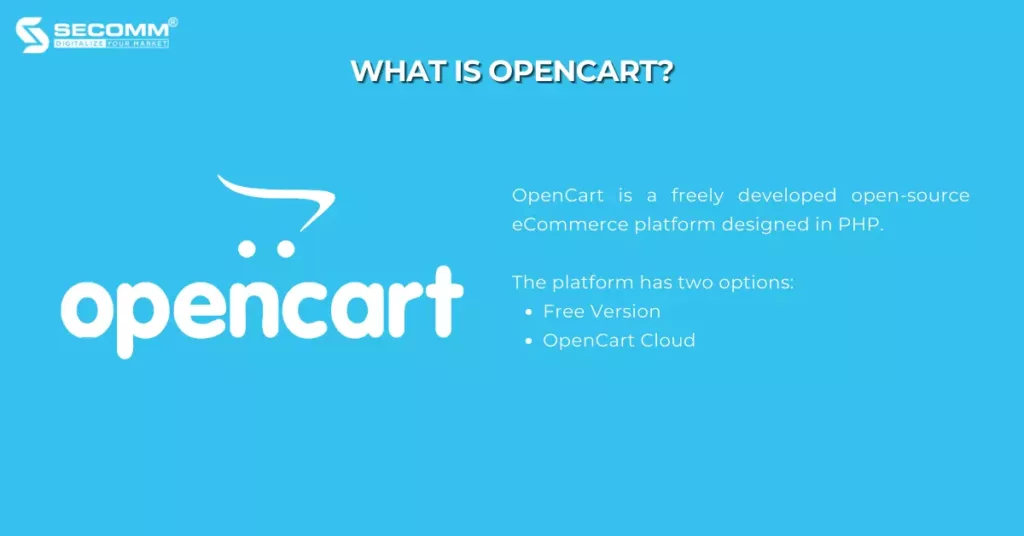
OpenCart offers two options for businesses:
As per Build With data, OpenCart has been adopted by over 400,000 websites, primarily by small to medium-sized businesses in the United States, Russia, the United Kingdom, Ukraine, and Brazil.
Related Reading: What is OpenCart? Key Pros and Cons of OpenCart
Magento (Adobe Commerce), much like OpenCart, is an open-source eCommerce platform developed using the PHP programming language. Magento stands as the ‘pinnacle’ among all open-source eCommerce platforms due to its comprehensive control and high scalability, offering a plethora of specialized features.
At present, Magento provides three primary editions, which are:
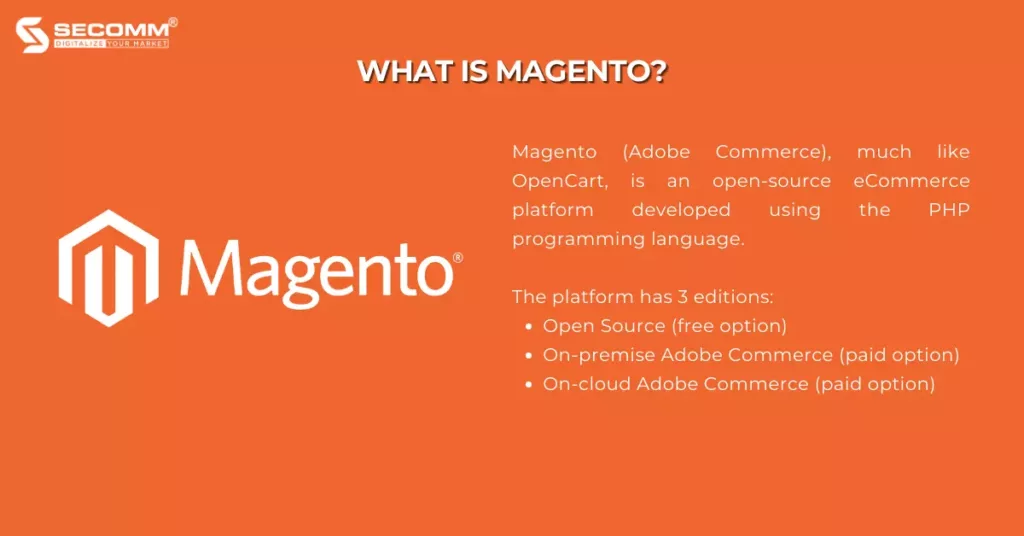
According to BuildWith, Magento supports over 160,000 websites, with significant popularity among large businesses in the United States, the United Kingdom, the Netherlands, and Germany.
Given the differences in service offerings between the paid versions of OpenCart and Magento, this SECOMM article will focus on comparing the two free versions.
Related Reading: What is Magento? Key Pros and Cons of Magento
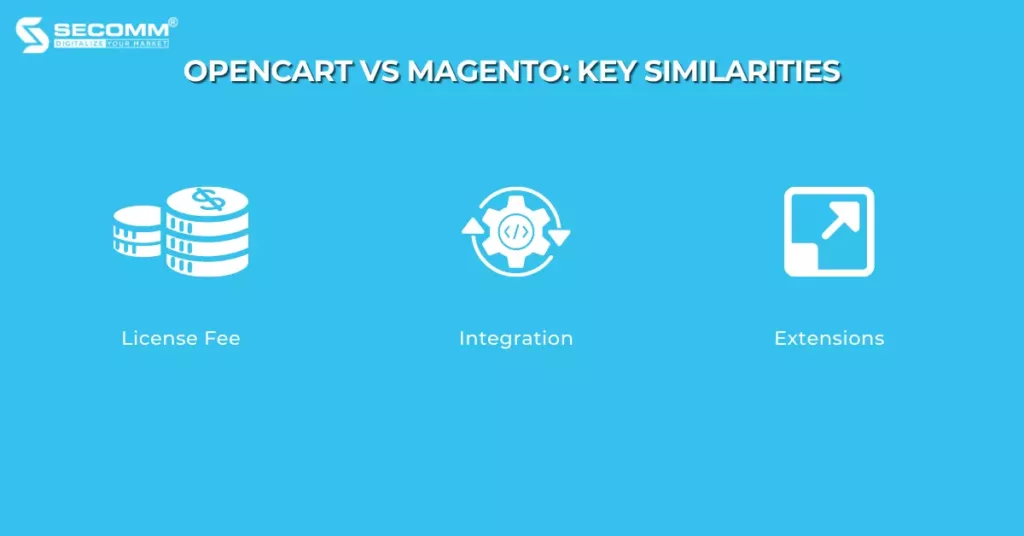
Overall, OpenCart and Magento are both open-source platforms developed using PHP. They are both robust eCommerce platforms with powerful features and a multitude of additional utilities.
The usage costs of OpenCart and Magento are quite alike, as both offer free enterprise versions that can be downloaded and installed without any charges.
Since they are open-source platforms, both possess exceptional customization capabilities for integrating third-party add-ons.
This enables businesses to effortlessly install and manage various management systems like POS, ERP, CRM, and others within a single system.
OpenCart offers an extensive library of extensions, with approximately 13,000 extensions at your disposal. Likewise, Magento boasts a vast collection of extensions, with over 5,000 to choose from.
Both platforms enable businesses to enhance their eCommerce websites with a plethora of additional features using these extensions, eliminating the need for coding concerns.
OpenCart is recognized as being more user-friendly for beginners, primarily due to its intuitive interface and straightforward installation process. However, businesses should still possess a basic level of technical knowledge related to hosting, FTP (File Transfer Protocol), security upgrades, and the like.
Within the admin dashboard, users can effortlessly navigate through sections such as ‘Catalog,’ “Extensions”, “Sales”, “System”, “Reports”, and “Help”.
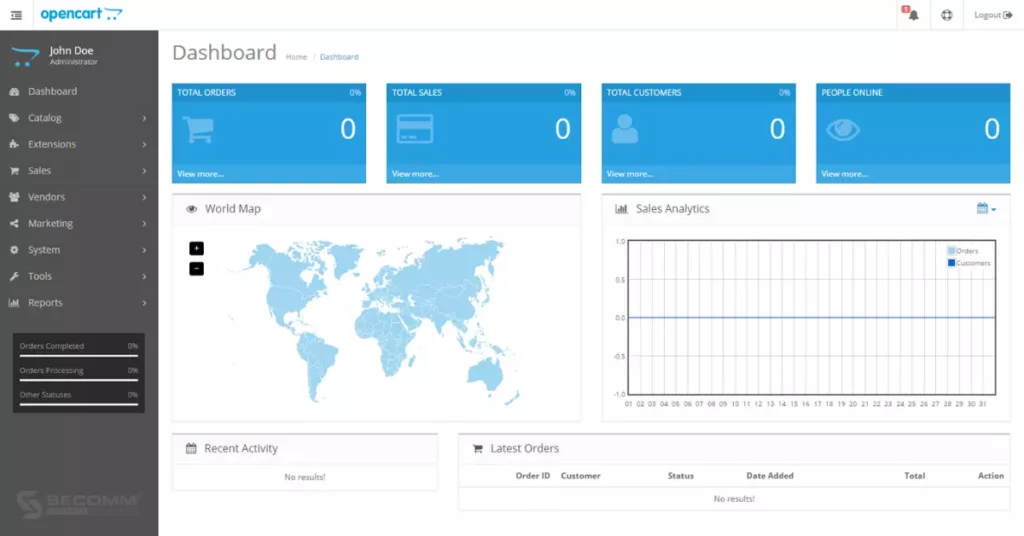
Magento isn’t a “playground” suited for beginners due to its intricate installation process, which demands a high level of technical expertise to set up.
While Magento 2 is considered more user-friendly than Magento 1, the admin dashboard still offers a multitude of options that can pose challenges for newcomers, especially when it comes to understanding Magento-specific terminology, resulting in a time-consuming learning curve.
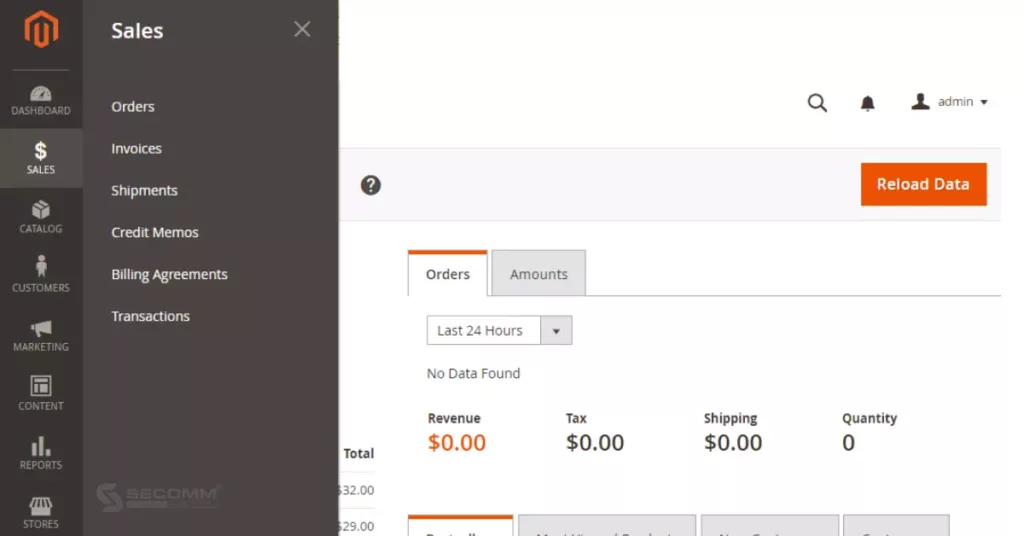
OpenCart provides around 500 themes, available in both free and paid options (ranging from $60 to $70), catering to diverse industries. This platform enables businesses to preview their website’s appearance with various themes before making a purchase. Subsequently, businesses can customize these themes according to their specific needs.
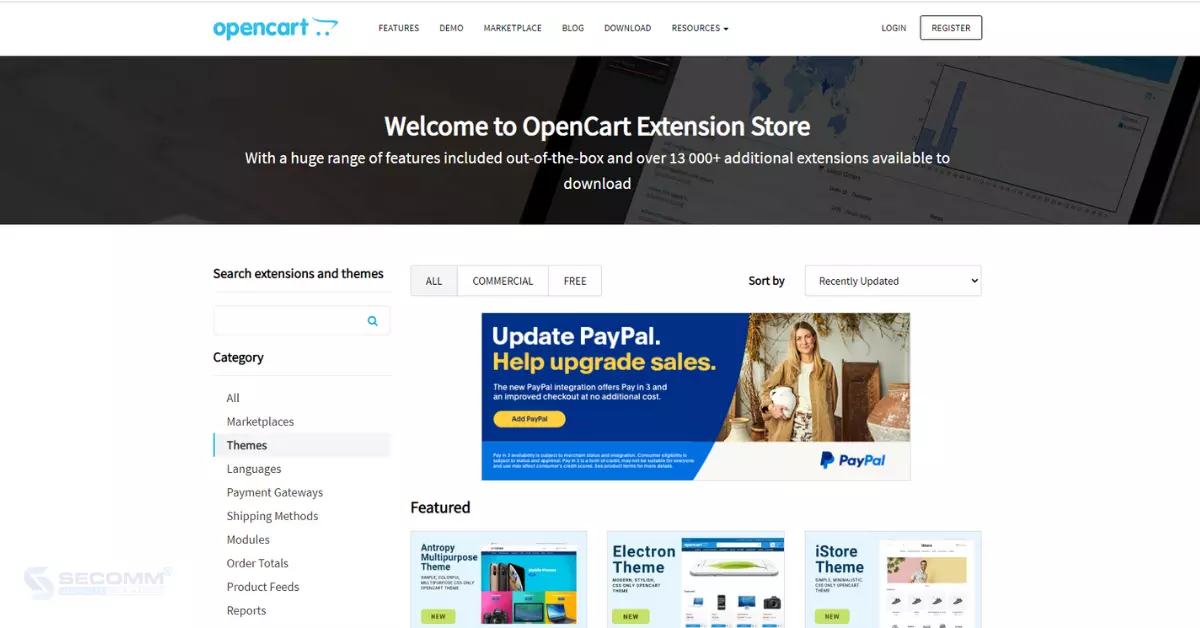
In the case of Magento, businesses have three options for creating user interfaces:
In summary, both OpenCart and Magento offer a wide selection of budget-friendly themes, but Magento allows for more extensive customization to optimize the eCommerce website’s interface.
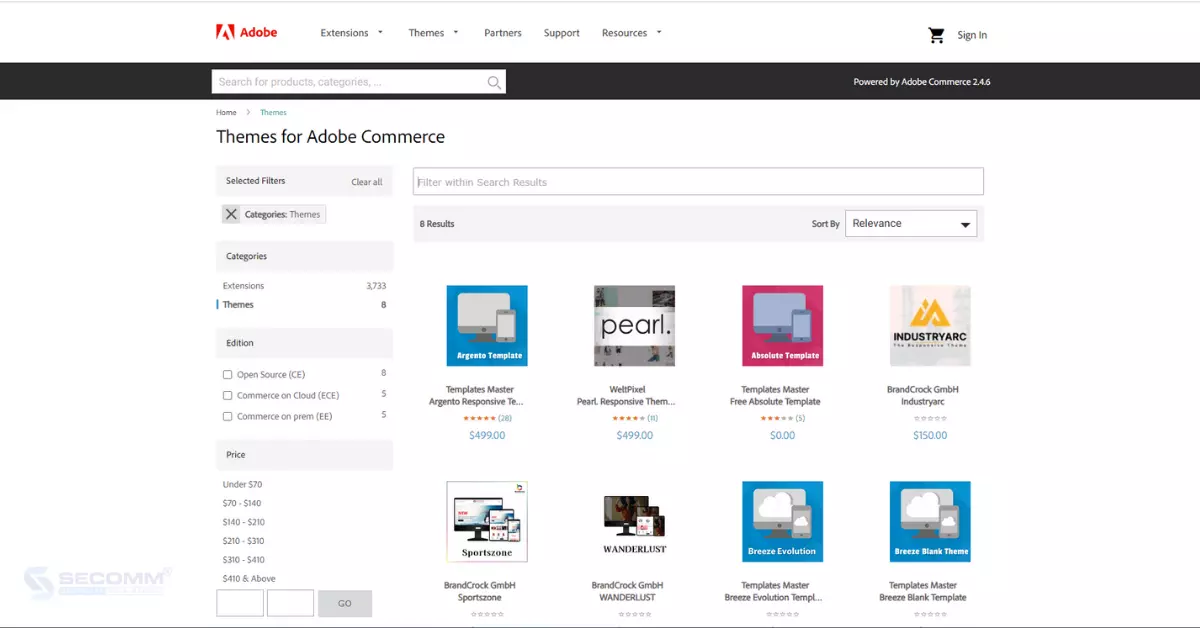
In terms of scalability, OpenCart is suitable for small and medium-sized business websites because it can only handle a limited number of products and transactions. On the other hand, Magento is specifically designed to manage large and complex eCommerce websites, capable of handling thousands of products and daily transactions without performance issues.
When it comes to flexibility, OpenCart provides a variety of extensions and add-ons to enhance website functionality. However, its flexibility may be somewhat constrained when dealing with intricate custom requirements. In contrast, Magento offers a higher degree of flexibility, enabling businesses to customize every aspect of their website. It boasts a comprehensive system of modules and better compatibility with third-party integrations, allowing businesses to tailor and expand their website to suit their specific needs.
Overall, Magento surpasses OpenCart in terms of scalability for eCommerce websites.
OpenCart offers two types of support to its users:
Magento provides a Help Center, but its support staff primarily focuses on Adobe Commerce, which may not fully address the needs of businesses using Open Source. However, Magento boasts a global developer community of over 13,000 individuals, making it relatively straightforward to find solutions.
OpenCart doesn’t assume responsibility for the security of eCommerce websites as it operates on an open-source platform. This means that OpenCart’s code and framework are publicly available, rendering websites more susceptible to potential attacks.
In contrast, despite also being an open-source platform, Magento places a strong emphasis on security. Magento has consistently released security patches since 2015 to identify vulnerabilities. This commitment ensures that eCommerce websites built on Magento maintain a high level of security, instilling confidence in online shoppers.
Through the use of third-party tools such as Mage Report and Mage Scan, businesses can assess their security status. Additionally, Magento employs CSP (Content Security Policy), which offers a structured set of principles for restricting browser content to trusted services only. This allows browsers to determine which web tools to block and which ones to trust.
Even though both OpenCart and Magento are provided with free licenses, there is a significant difference in the development costs for eCommerce websites.
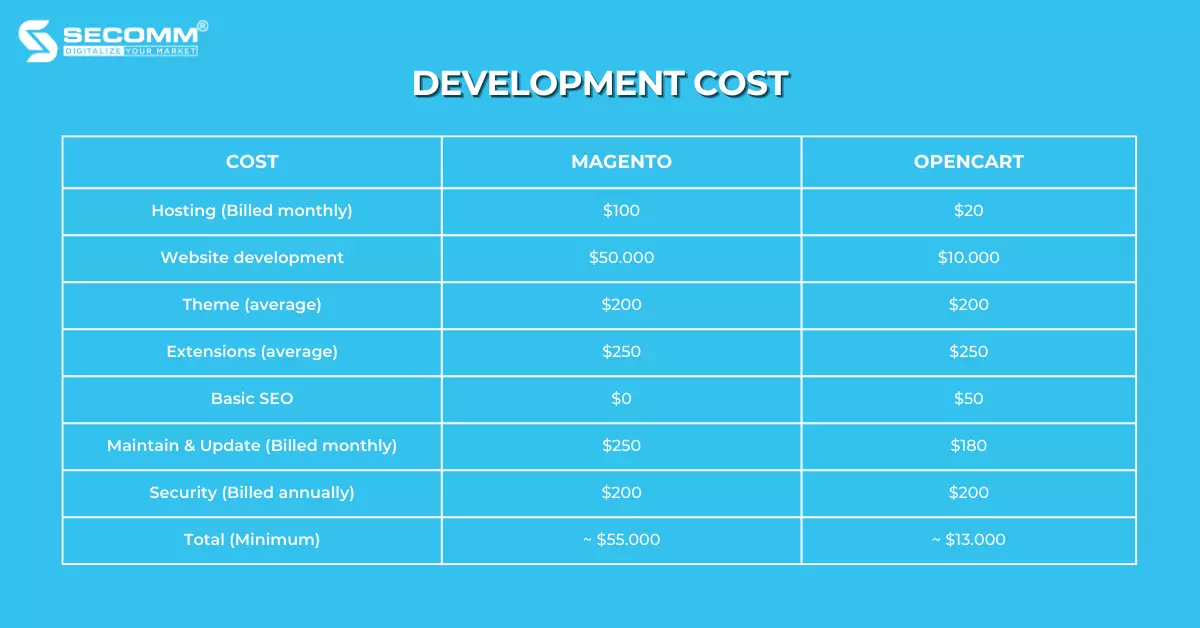
While Magento comes with a higher implementation cost than OpenCart, it offers a plethora of features for eCommerce websites. These include advanced search capabilities with Elasticsearch and OpenSearch, content editing tools that don’t require coding, support for categorizing a wider range of product types, and advanced shipping configuration, among others. In contrast, adding these features to OpenCart would necessitate the use of numerous extensions and increased storage resources to ensure efficient operation.
Considering the evaluations presented earlier, OpenCart proves to be a suitable choice for small and medium-sized enterprises (SMEs) seeking to establish their eCommerce websites. In contrast, Magento is an excellent fit for both SMEs and large corporations with specific and highly customizable eCommerce system requirements. Magento allows businesses to own a tailor-made system by either starting with a basic eCommerce website and gradually enhancing it or by creating a comprehensive system from the ground up.
With our extensive experience in implementing eCommerce solutions for clients across diverse countries, SECOMM comprehends the challenges and complexities that businesses encounter when selecting the ideal platform for constructing a professional eCommerce system.
Contact SECOMM today or call our Hotline at (02871089908) for a complimentary consultation.
 2
2
 9,392
9,392
 0
0
 1
1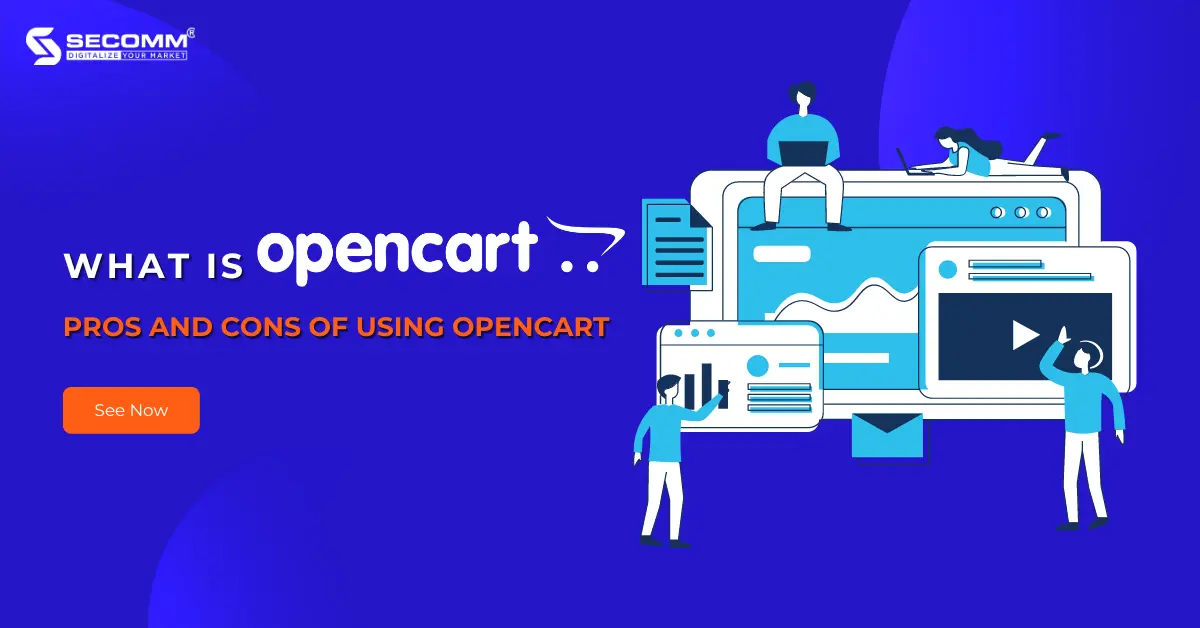
The eCommerce platforms are often considered the “backbone” of any experienced business in the market. To embark on the eCommerce journey, your business needs to choose the right eCommerce platform to build your website.
In addition to Magento, WooCommerce, Shopify, Squarespace, PrestaShop, etcOpenCart become a popular choice for many international SMEs.
OpenCart is an open-source eCommerce platform based on the PHP programming language, developed by Daniel Kerr in 1998. Currently, OpenCart offers two versions: Free and Cloud Store (Paid).
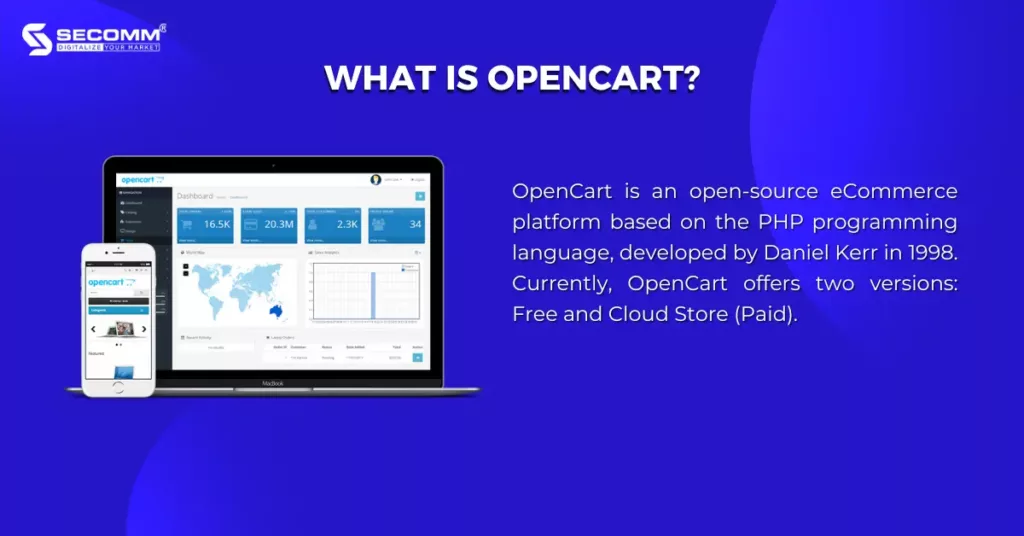
For the Cloud Store version, you have three solution options to build your eCommerce website:
According to BuiltWith, there are over 2,500 websites built on this platform. Some famous brands using OpenCart include WeLoveFine, GT Omega, Arrowfile, and Kleshna.
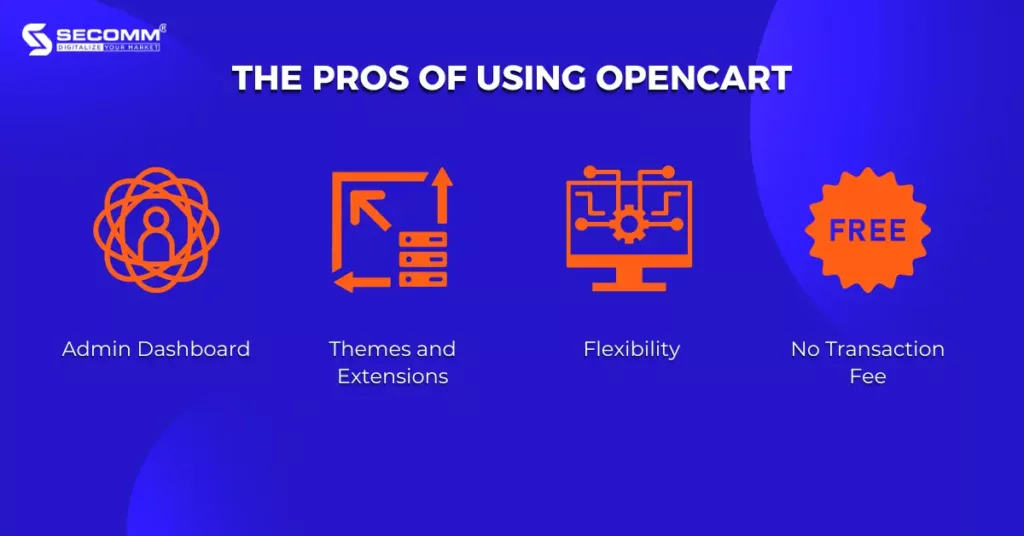
OpenCart is a user-friendly platform, even for those without technical experience. You don’t need to invest much time in training staff to manage products, orders, customer information, or other features on the website.
Over the years, OpenCart’s marketplace has offered more than 13,000 functional modules and ready-to-use themes. You can find suitable themes for any industry along with 3rd-party extensions, payment gateways, shipping providers, marketing tools, analytics, and reporting, which enrich your journey of building an eCommerce system.
With its nature as an open-source eCommerce platform, OpenCart has the ability to be flexibly customized. Also, you can own and control the entire source code. That said, you’ll customize code components, create updates, or even develop new features within the system based on your needs.
In addition, OpenCart also has good scalability, enabling you to upgrade to multiple languages and currencies for your global expansion goals.
For eCommerce platforms like Shopify, and BigCommerce, operating on a licensing model. This means they charge fees for platform usage on a monthly/yearly basis. These platforms typically charge an average transaction fee of 1.5% to 2% per transaction. On the contrary, OpenCart’s Cloud Store version charges no fees.
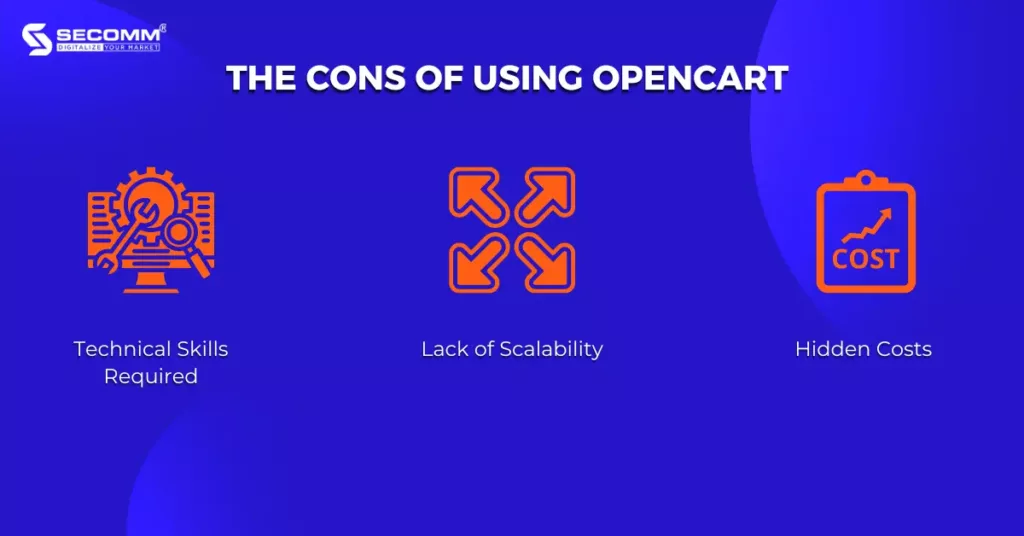
OpenCart is an open-source platform built with one of the most complex programming languages — PHP. That means, to successfully develop your own eCommerce website, you should build a skilled in-house team or collaborate with an experienced agency.
Although OpenCart offers many features, it may not be sufficient for you to manage and operate your complex eCommerce website. It’s different when compared to another PHP-based open-source eCommerce platform like Adobe Commerce (also known as Magento). Adobe Commerce allows you to expand from one website to multiple websites while managing them under the same system effectively.
It’s worth noting that OpenCart doesn’t charge transaction fees and it’s affordable cost of using OpencCart’s Cloud Store compared to other platforms. However, you need to add up the expenses for integrating various extensions. Each extension typically costs a minimum of $20 per month.
But if you want to create a comprehensive eCommerce website system, you may need at least 10 extensions. As a result, when opting for OpenCart, you should be aware of the potential hidden costs associated with these extensions.
OpenCart, with its own set of pros and cons, is generally a suitable eCommerce platform for small and medium-sized enterprises (SMEs). However, large-sized businesses looking for open-source eCommerce solutions may find platforms like Magento or Shopify Plus more fitting.
Having in-depth expertise and a track record of successfully developing complex eCommerce systems on Magento, such as Laybyland (Australia, US, New Zealand), Jasnor (Australia, New Zealand), and An Nam Group (Vietnam), SECOMM understands the challenges that businesses encounter when selecting and implementing an open-source eCommerce platform.
Get in touch with SECOMM today or call directly to the hotline at 02871089908 for a free consultation on tailored solutions for your eCommerce system development needs!
 2
2
 11,068
11,068
 0
0
 1
1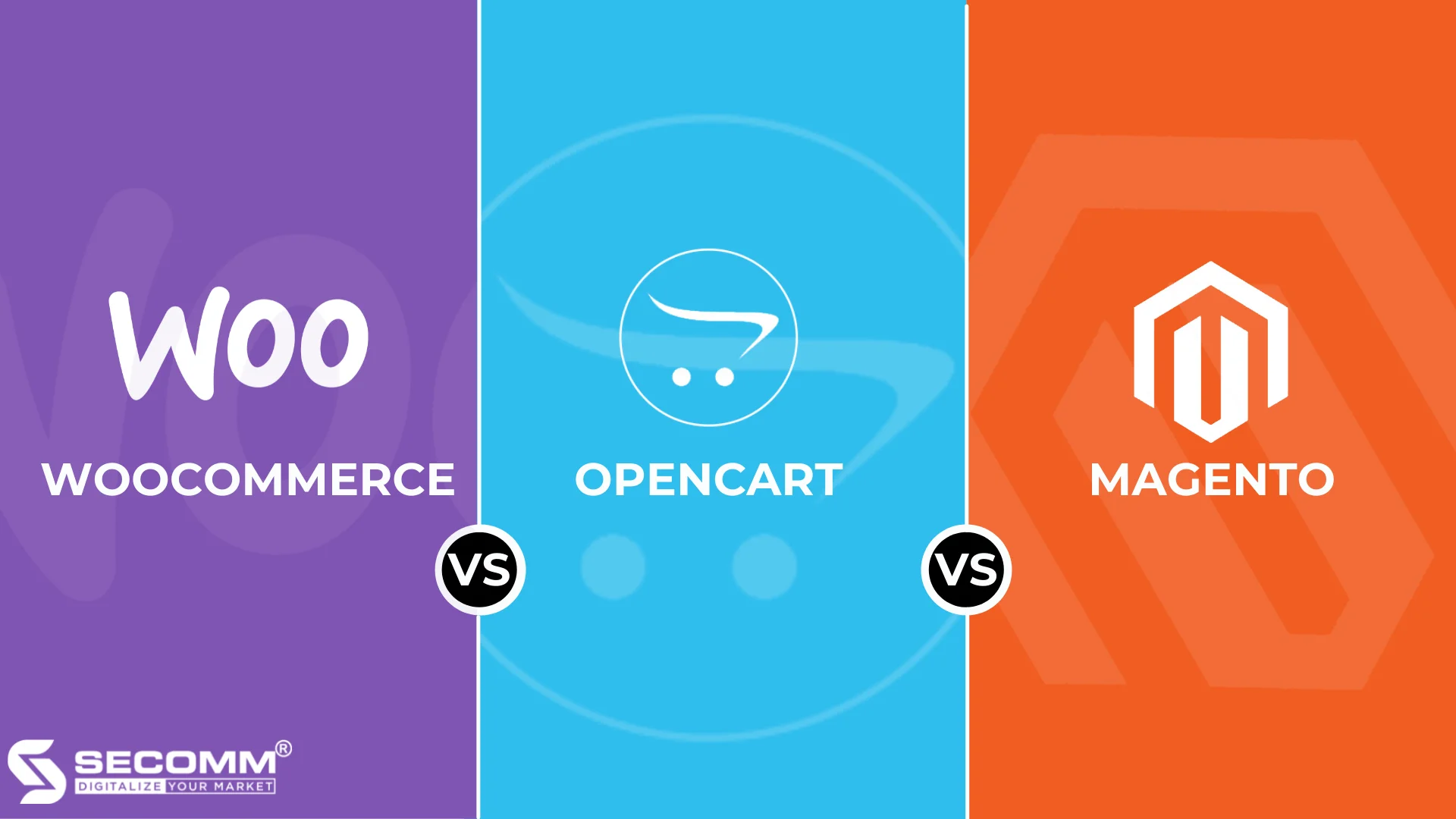
It’s important when it comes to choosing the right platform to build an effective eCommerce system. Businesses have many options to choose from either the open-source eCommerce platforms or any eCommerce platform as a service (SaaS, Paas), depending on the eCommerce business model and business plans.
To have a comprehensive eCommerce system, the open-source eCommerce platform is the business’s best friend, because of the great flexibility, scalability, customization according to the products, and catalogue characteristics.
In addition, the open-source platform also allows businesses to own the entire system source code and data. With all of these outstanding features, open-source platforms are slowly becoming the eCommerce development choices that many businesses are aiming for.
However, businesses need to carefully consider choosing the right platform. There are a lot of open-source eCommerce platforms on the market (OpenCart, WooCommerce, Magento,…), and each platform has its pros and cons.
WooCommerce is a WordPress plug-in introduced in 2011, completely free, and allows businesses to turn their WordPress sites into online stores, with built-in and additional features.
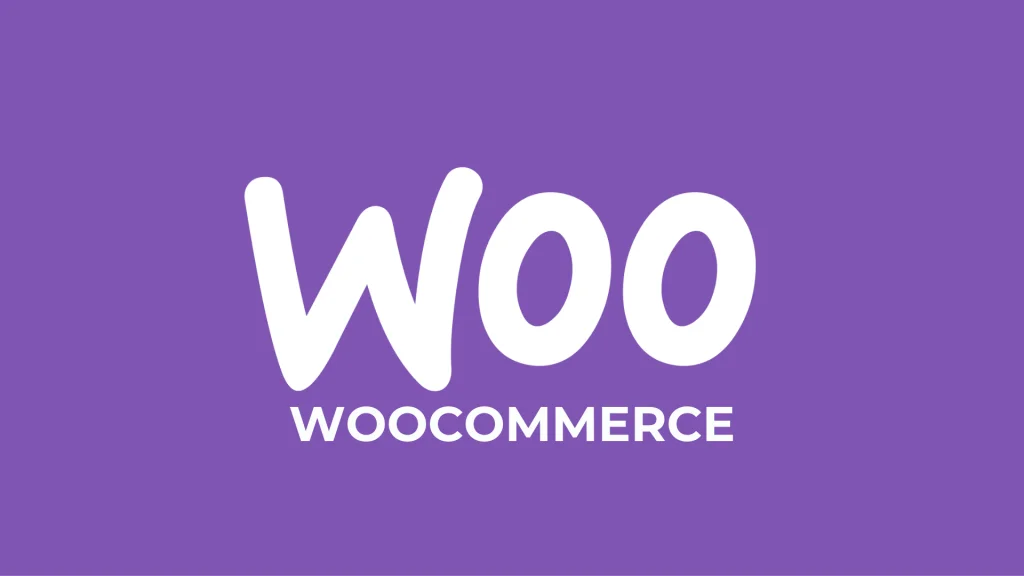
Ease of use
Many businesses that have been using WordPress for their online business, must be familiar with WooCommerce. Businesses can turn their website into an eCommerce system when implementing the WooCommerce Plugin into their WordPress website easily.
They can set up, integrate, and adjust functions on themes, and add-ons,… that have been built with high functionality from developers in a strong community around the world, making it easier to modify, and more flexible on the platform
In addition, WooCommerce is carefully built, convenient, also has huge and rich theme storage, and it is easy for businesses to design and build an e-commerce system right from the start, without knowing too much about technology.
Rich in features and add-ons
WooCommerce allows and supports features such as product management, orders, inventory, search engine optimization (SEO), discounts, sales, statistics reports, easy integration of payment units, shipping, handling units, and shopping experience optimization on all devices, making it easy for businesses to build a comprehensive system for simple and effective e-commerce business development.
Regarding security, WooCommerce ensures that businesses have the best security through a regularly updated system, and also ensures all of the business transactions are secure and safe through the features from the third-party services.
Low performance
One of the biggest disadvantages for businesses using the WooCommerce platform is the low performance, the system is easily overloaded with plug-ins and themes, and the number of products does not surpass 2000 SKUs, and often affects the system if the number of products exceeds the limit. Therefore, when businesses want to expand their business, it is necessary to consider switching to another platform.
Limited customization
WooCommerce is a plugin for WordPress, the platform lets businesses customize their eCommerce system, but building a complete, and comprehensive eCommerce system with unique features is very limited. The modification can cause instability for the system as well as the possibility that those built-in features are not compatible with the platform.
To customize a suitable system based on the available features system, businesses will face many challenges, it takes a lot of time and resources.
WooCommerce is perfect for businesses that are using WordPress and are looking to develop an e-commerce system. However, WooCommerce is not perfect for developing a comprehensive e-commerce system and expanding the business model. Some brands are using WooCommerce around the world such as Pluralsight LLC, and Gordon College, and famous brands in Vietnam such as Vietnam Airlines, Pharmacity, etc.
OpenCart is an open-source CMS (Content Management System) using PHP language, similar to WordPress but specially designed for e-commerce.
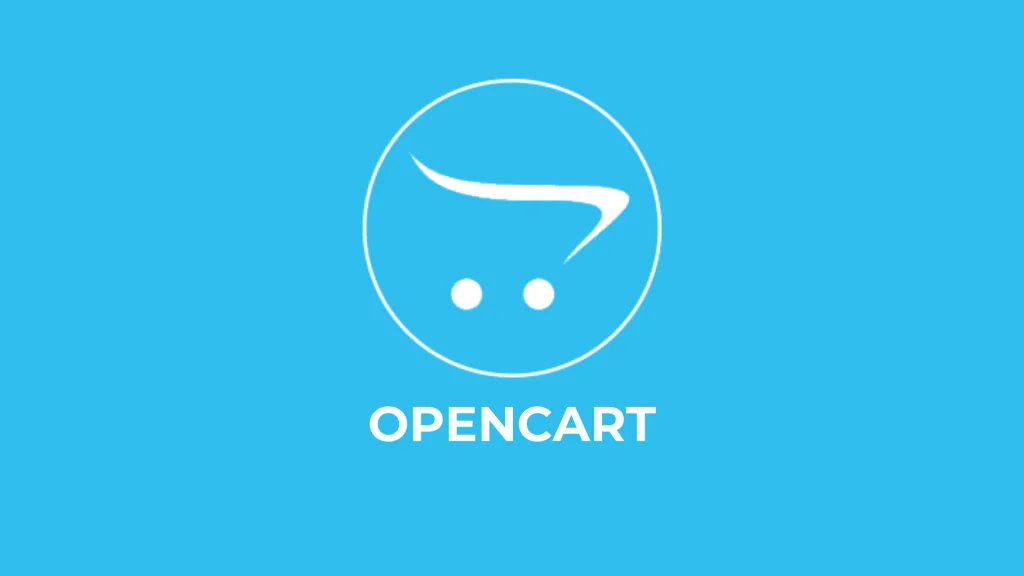
Friendly interface and easy-to-use
OpenCart provides an intuitive, easy-to-use, friendly interface, which is specialized for
the eCommerce industry. In addition, OpenCart also provides a completely free variety of interfaces and features, making it easy for businesses to develop e-commerce systems with basic website development knowledge and skills. Because OpenCart is built based on the MVC Model (Model- View- Controller), developing and writing a module for an e-commerce system on this platform is also quite easy.
Full of basic e-commerce features and a variety of add-ons.
OpenCart supports businesses with every basic e-commerce feature. Since OpenCart is a CMS specially designed for e-commerce, the open-source commerce platform such as OpenCart fully supports basic e-commerce functions such as sales, sales management, data management, statistics, customer data lists, and invoices.
Businesses can easily create and manage many different stores on the same system without having too much technical knowledge. This also means that businesses can access and manage all data of multiple stores at the same time with just one single central OpenCart system.
Not only supporting businesses build and manage an eCommerce system, but OpenCart also supports marketing such as search engine optimization (SEO), keyword advertising (Adwords), marketing programs, and affiliate marketing programs to be able to reach customers more easily, increase sales on the eCommerce system.
On top of the basic e-commerce functions, OpenCart also has additional applications to support businesses such as daily business operations and product categories. The backup and restore function helps businesses always have a backup system in hand and ready to restore all of the data on the system in case of an emergency
Besides that the platform also has many features such as a shopping cart, support customers to buy many products at once; gift features issuing gift cards, and loyalty programs. In addition, businesses can integrate other utilities such as payment gateway VNPay, and PayCEC, to help businesses have a better, faster, and seamless shopping experience.
Customization
With all of the basic features of an open-source program, businesses can easily modify, edit and customize on the OpenCart platform. In addition, the OpenCart e-commerce platform has a great ecosystem with many functions suitable for e-commerce business, firms can fully explore, as well as develop modules that are suitable for a satisfactory e-commerce system.
Although the OpenCart platform has many advantages that are the best fit for e-commerce businesses, there are also some limitations that businesses should be aware of when using the platform.
Low performance, and unstable
Although the platform is highly rated and well designed for the eCommerce industry, the system is still not stable enough because the modules and functions are not fully optimized, many errors occur while operating, as well as the installation steps are still very perplexing.
Therefore, businesses still encounter many problems when building and operating, which might affect the business’s processing speed as well as the revenue.
Feature development costs can become expensive
OpenCart owns extensive storage with quite a lot of basic features to serve e-commerce businesses quickly and conveniently, but the platform still cannot meet the advanced and specialized features according to specific product characteristics, product categories, and business needs of each field.
Therefore, businesses will need to invest time and resources to develop advanced features. For example, the SEO feature is supported on the platform, but there are many difficulties when censoring content via Google, not as effective as on the WordPress platform.
The OpenCart platform is relatively new compared to other platforms on the market, has many limitations and needs to be optimized. Similar to the WooCommerce platform, this is a good platform to start an ecommerce business, but not perfect for developing a comprehensive ecommerce system that goes along with growing and scaling your business. Some of the international brands that are using OpenCart such as Sunglass Hut, Virgin Enterprise, Audio-Technica Ltd, and the brands in Vietnam that are using OpenCart are Mobifone, RitaVo, etc.
Magento is an open-source platform specially built for e-commerce. It is recognized as one of the leading e-commerce platforms today, offering various outstanding advantages such as high flexibility, a diverse ecosystem, and optimal security. Currently, Magento has two versions: Magento Open Source (free) and Magento Commerce (paid).
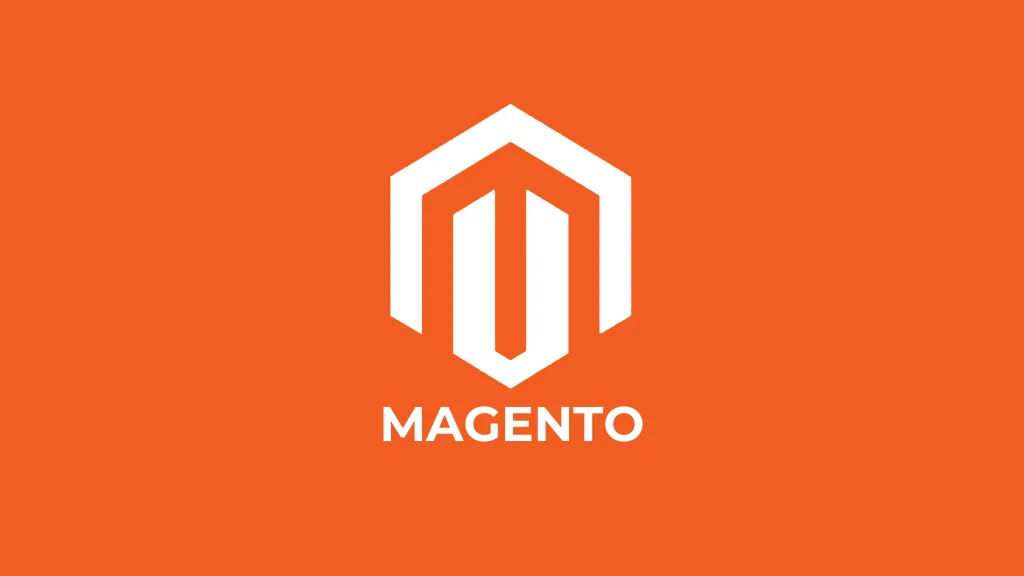
Diverse features for e-commerce from basic to advanced
Magento possesses many features available from basic to advanced to develop a complete e-commerce system including Category Management, Content Management, Customer Management, Marketing Management, Order Management, Store Management, System Management, Shopping Cart and Checkout, Reporting & Analytics. These features have been built with flexibility, and high availability to deliver outstanding results when integrated into the system, meeting all of your business e-commerce operations and sustainable growth needs
Scalability
One of the biggest fears of all ecommerce businesses is having a slow, poorly functioning system, or being overwhelmed when there are too many SKUs. With Magento, businesses do not need to worry about these issues even with millions of SKUs or thousands of transactions per hour. Magento can meet all the operational requirements, and business sustainable e-commerce development needs, with the ability to handle up to 500,000 products, and thousands of transactions in an hour.
High flexibility and customizability
Owning all of the advantages of an open source ecommerce platform, Magento has outstanding flexibility and customization. Businesses can easily change and develop new and specialized features according to the characteristics of products, industries, and businesses to be able to catch up with the rapid change of the market.
On top of that, businesses easily integrate third-party systems such as payment, shipping, POS, ERP, CRM, PIM, and BI to help develop all resources, and seamless processes without affecting the level of production, and the performance of e-commerce systems.
A global community for technical support and consulting
The customer support from Magento is for the customers, who are using the enterprise version, Magento Commerce. For customers, who are using the free edition, of Magento Open Source, there will not be any customer support from the platform.
However, Magento has a strong global technical support and consulting community. Therefore, most of the problems in eCommerce that businesses are facing can be solved from the Magento ecosystem or extensions from a third party. Having a strong global technical support community is also a testament to the level of reliability, quick resolution, and constant updates that Magento open source platform brings to customers.
High development costs
Magento open source e-commerce platform is highly appreciated with outstanding functions to develop a sustainable commerce platform, but businesses need to invest significant resources to deploy and develop the system.
Magento is an open source platform built specifically for e-commerce. This is known as one of the leading eCommerce platforms today on the market with many outstanding advantages such as high flexibility, diverse ecosystem and optimal security. Currently, Magento has 2 versions: Magento Open Source (free), and Magento Commerce (paid).
Magento has several outstanding features to develop a complete e-commerce system, and become a one-stop-shop for businesses that need development:
High Scalability
The biggest fear of all e-commerce businesses is having a slow, poor-performing website, or being overloaded with too many SKUs. With Magento, businesses do not need to worry about these issues, whether they have millions of SKUs or thousands of transactions per hour. Magento can meet all business needs for sustainable e-commerce operation and development. Therefore, businesses can scale up their business with Magneto.
High flexibility and customizability
The fact that the Magento platform has a high degree of flexibility is because of an open source platform. Businesses can modify and customize the templates, as well as adjust the features that the business needs to operate. In addition, businesses can completely build features from scratch to have an e-commerce system that is most suitable for businesses.
On top of that, businesses can easily integrate third-party systems such as ERP, CRM, and payment methods without affecting the level of performance of the main e-commerce system. In addition, businesses can easily separate the front-end interface from the back-end commercial activities.
Magento is an ideal place for businesses to host their software, but also a place with a lot of features. If your business currently has an experienced developer, or finances to attain a developer, and is ready to have an impressive e-commerce system, then Magento is a good choice. You have complete freedom to adjust the features until you are satisfied with your e-commerce system.
Big developer’s community around the world
However, the customer care from the Magento e-commerce platform is completely absent, in addition to that, Magento has a global developer support community. Therefore, there will be a lot of support for businesses to solve problems, and related techniques, as well as advice on building the most suitable solutions for businesses anytime, anywhere, and of course with a fee.
High development cost
A fully functional ecommerce system for a business is estimated to be at least $20,000 annually or more. If your business is just getting into e-commerce and has absolutely no technology experience, choosing Magento is a risky choice. But if businesses have the capacity and resources to run the system with this platform, then business growth will be faster with additional features such as sales automation.
Fully functional enterprise versions are estimated to be at least $20,000 annually or more. If your business is just getting into e-commerce and has absolutely no technology experience, choosing Magento is a risky choice. But if businesses have the capacity and resources to run the system with this platform, then business growth will be faster with additional features such as sales automation.
Complexity of specialized functions
Many businesses currently still face difficulties when transforming to e-commerce because of the specific characteristics of different industries and fields. These specific functions require an appropriate technology solution to ensure that the ecommerce system can operate efficiently and sustainably after the transformation. To build a specific feature with high complexity for an e-commerce system, businesses will need to spend more resources and time than the usual plan that businesses have set out to get a solution that fits the specific requirements of your e-commerce business.
Vietnamese firms that are using Magento
Magento is the best-fit solution for small and medium B2C businesses that have the need as well as the time, manpower and skills to build an e-commerce system. Famous brands in Vietnam are using the Magento ecommerce platform: Sendo, Vietnamworks, SJC, etc.
Different e-commerce platforms offer different features and values. No matter what route your business follows when building your e-commerce system, always think carefully about the following factors:
BigCommerce
With BigCommerce, businesses can choose the price that suits their business needs. In addition, the BigCommerce eCommerce platform is designed for everyone to use, from beginners to professional developers. However, if the business does not have a lot of capacity, as well as finance, then using BigCommerce to develop an e-commerce system is not suitable.
WooCommerce
With the WooCommerce ecommerce platform, businesses have full control over the ecommerce system. In addition, businesses can freely compare, and adjust any functions in the ecommerce system. However, expanding your business on the WooCommerce platform would be an inappropriate choice, as the platform can be overloaded with functions on the ecommerce system. However, businesses can start an ecommerce system with WooCommerce with less investment than competitors like BigCommerce.
Magento
Magento is a comprehensive ecommerce platform capable of supporting businesses to expand and grow their business in all aspects. However, all the disadvantages of Magento can be narrowed down to a single problem: the technical challenges, which require businesses to have an in-depth programming team. Meanwhile, businesses can solve this by having a team with experience building e-commerce systems.
Businesses can contact SECOMM to receive detailed advice for the journey to develop a comprehensive and sustainable e-commerce system for businesses and consult Magento solutions specifically for SMEs in Vietnam!
 2
2
 14,457
14,457
 0
0
 1
1Subscribe to get the latest eBook!
Hotline